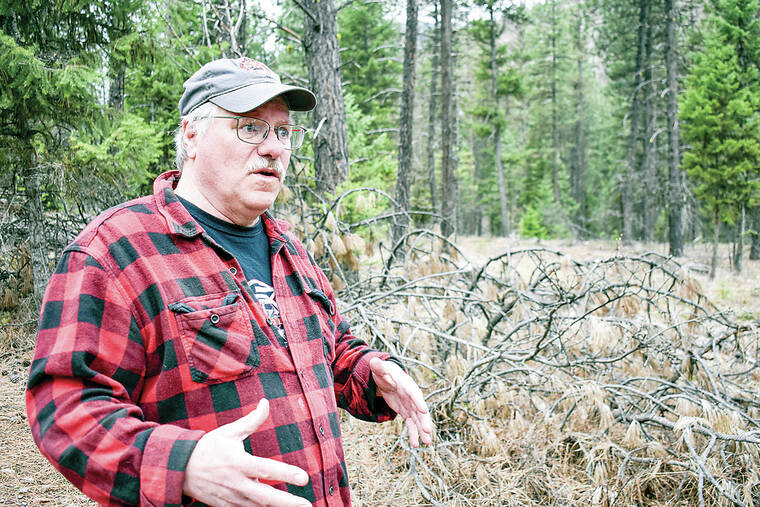Victims of Montana asbestos pollution that killed hundreds take Warren Buffett’s railroad to court
LIBBY, Mont. — Paul Resch remembers playing baseball as a kid on a field constructed from asbestos-tainted vermiculite, mere yards from railroad tracks where trains kicked up clouds of dust as they hauled the contaminated material from a mountaintop mine through the northwestern Montana town of Libby. He liked to sneak into vermiculite-filled storage bins at an adjacent rail yard, to trap pigeons that he would feed, during long days spent by the tracks along the Kootenai River.
Today, Resch, 61, is battling an asbestos-related disease that has severely scarred his left lung. He’s easily winded, quickly tires and knows there is no cure for an illness that could suffocate him over time.
ADVERTISING
“At some point, probably everybody got exposed to it,” he said, speaking of asbestos-tainted vermiculite. “There was piles of it along the railroad tracks. … You would get clouds of dust blowing around downtown.”
Almost 25 years after federal authorities responding to news reports of deaths and illnesses descended on Libby, a town of about 3,000 people near the U.S.-Canada border, some asbestos victims and their family members are seeking to hold publicly accountable one of the major corporate players in the tragedy: BNSF Railway.
Hundreds of people died and more than 3,000 have been sickened from asbestos exposure in the Libby area, according to researchers and health officials. Texas-based BNSF faces accusations of negligence and wrongful death for failing to control clouds of contaminated dust that used to swirl from the rail yard and settle across Libby’s neighborhoods.
The vermiculite was shipped by rail from Libby for use as insulation in homes and businesses across the U.S.
The first trial among what attorneys say are hundreds of lawsuits against BNSF for its alleged role polluting the Libby community is scheduled to begin Monday.
The railroad — owned by Warren Buffett’s Berkshire Hathaway Inc. — has denied responsibility in court filings and declined further comment.
Resch works at an auto dealership in Libby and his wife is listed as a plaintiff in a pending lawsuit against BNSF in Montana’s asbestos claims court. He’s uncertain whether his sickness came from the rail yard. The Libby high school track included contaminated vermiculite, as did insulation in the walls and attics of homes he entered during his two decades as a volunteer firefighter.
The plaintiffs for the upcoming trial against BNSF, the estates of Joyce Walder and Thomas Wells, lived near the Libby rail yard and moved away decades ago. Both died in 2020 of mesothelioma, a rare lung cancer caused by asbestos that is disproportionately common in Libby.
The mine a few miles outside town once produced up to 80% of global vermiculite supplies. It closed in 1990. Nine years later, the Environmental Protection Agency arrived in Libby and a subsequent cleanup has cost an estimated $600 million, with most covered by taxpayer money.
It’s ongoing, but authorities say asbestos volumes in downtown Libby’s air are 100,000 times lower than when the mine was operating.
Awareness about the dangers of asbestos grew significantly over the intervening years, and last month the EPA banned the last remaining industrial uses of asbestos in the U.S.
The ban did not include the type of asbestos fiber found in Libby or address so-called “legacy” asbestos that’s already in homes, schools and businesses. A long-awaited government analysis of the remaining risks is due by Dec. 1.


